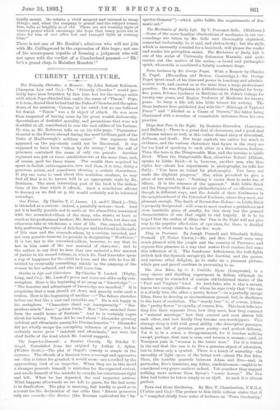The New Eden, by C. J. Cutliffe Hyne (Longmans), is
a very clever and startling experiment in fiction, although its readers may be reminded of certain old-fashioned stories of the "Paul and Virginia" kind. An Archduke, who is also a savant, leaves two savage children—of whom he says truly that "the one is a sturdy tree, the other a pretty flower "—in a perfectly savage Eden, there to develop as circumstances permit, but, in obedience to the laws of evolution. The "sturdy tree" is, of course, Adam; the "pretty flower" is equally, of course, Eve. This book tells how they live their separate lives, how they meet, how they contract a "natural marriage," how they quarrel and even almost kill each other, and how finally they become sun-worshippers. This strange story is told with great ability—the descriptive passages, indeed, are full of genuine prose poetry—and perfect delicacy. Yet it is, in a sense, a disappointment, for it teaches nothing except, perhaps, that man is man, and woman is woman,—and, as Tennyson puts it, "woman is the lesser man." For it is hinted in the end that the sun is to Eve a genuine object of adoration, but to Adam only a symbol. There is a touch of unreality—the unreality of light opera of the better sort—about The New Eden. Thus, the terrible quarrels between Adam and Eve—and, in particular, Eve's feminine, nay feline, vindictiveness—ought to be considered very grave matters indeed. Yet somehow they suggest nothing more serious than Byron's "comic horror." The New Eden had better be taken simply as an idyll. As such it is almost perfect.


















































 Previous page
Previous page